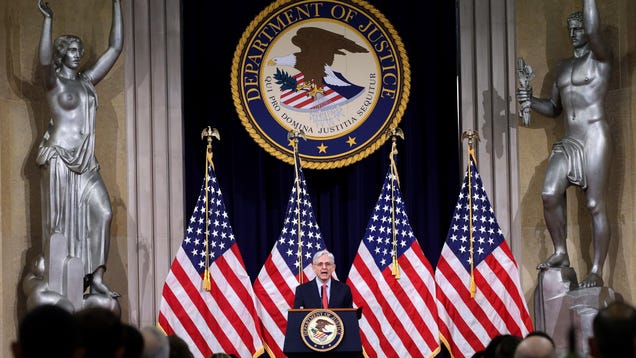A federal judge appointed by Donald Trump held firm this week by declining a request to delay a controversial order barring government agencies from making content moderation requests to social media companies. The Justice Department is already appealing the decision, according to court filings, and said in a statement it would seek an emergency action from the Supreme Court if its appeal is rejected.
Judge Terry A. Doughty defended his ruling Monday against critiques who claimed its wide-reaching scope was overly broad and lacking in specificity. Doughty said the injunction, which applies to a wide swath of government agencies, including the Department of Homeland Security and the Cybersecurity and Infrastructure Security Agency, is actually “not as broad as it appears.”
“It only prohibits something the Defendants have no legal right to do—contacting social media companies for the purpose of urging, encouraging, pressuring, or inducing in any manner, the removal, deletion, suppression, or reduction of content containing protected free speech posted on social media platforms,” Doughty wrote. “It also contains numerous exceptions.”
Those exceptions primarily apply to government communications with tech firms intended to warn the companies of national security threats, criminal activity, and voter suppression. Government agencies and prominent trust and safety experts critical of the ruling argue those carveouts are too limited and could impede moderators’ ability to quickly root out disinformation campaigns and other potentially harmful operations ahead of upcoming elections.
“The injunction threatens to chill this wholly lawful conduct, and to place the Judiciary in the untenable position of superintending the Executive Branch’s communications,” Joe Biden’s Justice Department wrote in a motion this week. “It raises grave separation-of-powers concerns.” The Justice Department did not immediately respond to Gizmodo’s request for comment.
Lawsuit accuses Biden of using the presidency to silence conservative talking points
Doughty’s 155-page ruling sided with attorneys general in Louisiana and Missouri who sued Biden and other top government officials like Anthony Fauci for allegedly violating their First Amendment rights. Agreeing with the AGs, Doughty said government agency recommendations to have social media companies remove perceived misinformation regarding vaccine ham, the China-lab leak theory, Hunter Biden’s laptop, and other hot-button issues amounted to suppression of conservative speech and “arguably involves the most massive attack against free speech in United States’ history.”
The preliminary injunction has already led to a breakdown in communication between agencies and tech companies. Last week, a State Department official told Gizmodo that its Global Engagement Center postponed a meeting with Meta while it reviewed the ruling. The spokesperson said that the meeting was intended to focus on information sharing with the goal of countering foreign disinformation overseas. Facebook employees similarly told the Washington Post, all planned meetings between the company and the agency were to discuss content takedowns were “cancelled pending further guidance.” Meta did not immediately respond to Gizmodo’s request for comment.
“There will likely be a chilling effect from overly cautious government counsels,” a former Department of Homeland Security Official told the Post. “What previously had been inbounds will look too close to the line, or we’re not sure how it’s going to work.”
Digital speech experts speaking with Gizmodo expressed uncertainty when asked the government contacts with tech companies crossed a line into potential First Amendment violations. NetChocie, an industry organization whose members include Meta and Google, has spoken out favourably about the judge’s ruling, which they argue will give tech firms more editorial freedom. Misinformation experts, on the other hand, fear that freedom could inevitably result in a rise in harmful content surfacing across platforms.
“American social media businesses have a right to editorial discretion, including content moderation free of government coercion, whatever those decisions may be,” NetChoice Vice President & General Counsel Carl Szabo told Gizmodo. “The government attempting to control what speech appears online undermines this right—and free speech values in the United States.”
